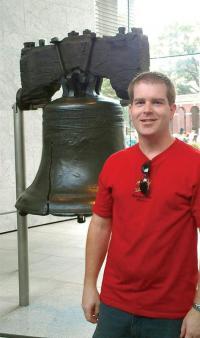Freedom and Physics for All

The author visits the Liberty Bell in Philadelphia. Photo courtesy of Sean Bentley.
As a professor at Adelphi University in Garden City, New York, I enjoyed teaching introductory physics, math methods, and quantum mechanics. However, the most important class I taught focused on physics in society. It explored energy, security, climate, medicine, transportation, and many other topics in the world around us affected by the physical sciences.
Physics is not some esoteric subject to be studied only by those who want to simultaneously tackle intense mathematics and challenging philosophical questions. A basic understanding of physics is now central to being an informed member of society.
Being well-versed in physics provides you with not only an opportunity but also a duty. “With great power comes great responsibility,” stated Voltaire (though the quote is now more commonly attributed to Peter Parker’s Uncle Ben). You understand concepts connected to major societal issues and have a unique toolbox of wonderful problem-solving skills. The world needs this combination as we address the challenges that face us. In all that you do, you can be an advocate for science and rational thought. You can have a positive impact through small actions.
“Activism” is not a dirty word!
Unfortunately, many in physics do not get actively involved in advocacy. When people think of policy and advocacy, they often picture either someone wearing a suit and working “inside the Beltway” or someone marching and carrying a picket sign. Professional policy careers and public protests may not be right for you, but you still can and should be actively involved in policies that touch aspects of your professional and personal lives.
Start by carefully exploring issues of interest to you and weighing all the factors related to those issues—factors related to science, culture, economics, the environment, and so on. Realize that societal problems, much like real physics problems, often do not have simple analytic solutions. If they did, we would be living in a utopia by now! Listen to everyone’s opinions, examine the evidence critically, and make an informed choice.
Then act on your decision. Vote. Write letters to elected officials. Engage in public outreach. Don’t be passive—"activism” is not a dirty word!



